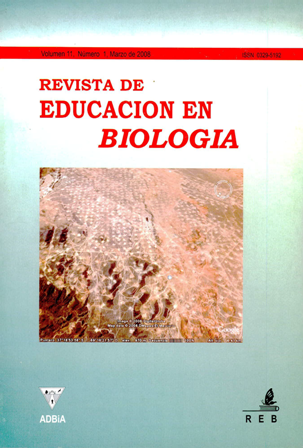Desinterés del Pasado, Decisiones del Futuro: educación para prevenir las invasiones biológicas
Contenido principal del artículo
Resumen
La introducción de especies exóticas es la segunda causa de la pérdida de biodiversidad mundial después de la destrucción física del hábitat. Cuando las especies exóticas o no-nativas se vuelven invasoras, generan impactos ambientales (tanto en el medio acuático como terrestre). Económicos y sociales. Estos pueden percibirse en la modificación del nuevo hábitat nativo, como por ejemplo macrofouling (incrustaciones en el medio acuático de organismos mayores a 1mm, sobre organismos y/o estructuras artificiales), en la introducción colateral de parásitos (potenciales causantes de enfermedades), depredadores de especies comerciales, etc. El objetivo del presente artículo as aportar un marco teórico acerca de las invasiones biológicas (en especial referida al medio acuático) como uno de los aspectos a tener en cuenta al abordar las causas que conducen la pérdida de biodiversidad, y como herramienta para su utilización en el aula.
Detalles del artículo

Esta obra está bajo una licencia internacional Creative Commons Atribución-NoComercial-CompartirIgual 4.0.
Aquellos autores/as que tengan publicaciones con esta revista, aceptan los términos siguientes:- Los autores/as conservarán sus derechos de autor y garantizarán a la revista el derecho de primera publicación de su obra, el cuál estará simultáneamente sujeto a la Licencia de reconocimiento de Creative Commons que no se permite un uso comercial de la obra original ni de las posibles obras derivadas, la distribución de las cuales se debe hacer con una licencia igual a la que regula la obra original.
- Los autores/as podrán adoptar otros acuerdos de licencia no exclusiva de distribución de la versión de la obra publicada (p. ej.: depositarla en un archivo telemático institucional o publicarla en un volumen monográfico) siempre que se indique la publicación inicial en esta revista.
- Se recomienda a los autores/as difundir su obra a través de Internet (p. ej.: en archivos telemáticos institucionales o en su página web) después del proceso de publicación, lo cual puede producir intercambios interesantes y aumentar las citas de la obra publicada. (Véase El efecto del acceso abierto).

